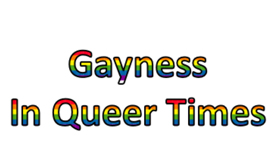Call For Papers
Gayness In Queer Times
Workshop & Conference
University of Brighton, UK
June 13th & 14th 2019
Keynote speaker: Prof David Halperin (University of Michigan)
Author of ‘How To Be Gay’ and ‘Gay Shame’
Invitation from the conveners: Introducing the English translation of Mario Mielli’s 1977 ‘Towards A Gay Communism’, Tim Dean describes Mieli’s articulation of gayness as ‘loosening gayness from an exclusively sexual orientation to something more capacious’ (Mieli 2018:xi). Yet Mieli was writing before the emergence of queer theory, and in contemporary scholarly work around sexuality and sexual identity, queer appears to have achieved a hegemonic status. Over the past decade the articulation of theory or politics that is explicitly gay (rather than queer or LGBTQ) has often been attached to limiting, exclusionary, and oppressive practices, particularly regarding race and gender. As an unsurprising result, in both academia and activism ‘gay’ is frequently framed as the normative, assimilationist, and exclusionary past to queer’s fluid, radical, and inclusive present and future.
Yet critically engaging with what gay and queer mean (or could mean) nowadays can be elided precisely because of this problematic juxtaposition. While in many ways we broadly align ourselves with queer thought, we are sceptical of knee-jerk tendencies to unquestioningly surrender gay to a politics of exclusion and neoliberal assimilationism. We want to challenge and interrogate assumptions of how gay can be known and conceptualised, beyond conflation with / reduction to homosexuality. Consequently, this conference invites a focus explicitly gay scholarships, theories, identities, identifications, politics, cultures, histories, and futures. It asks:
‘Does gay have anything useful to offer in queer times?’
As part of its engagement with this question, the conference will include a limited-attendance half-day workshop with Prof David Halperin, focused on his influential text ‘How To Be Gay’.
We invite scholarly, activist, and artistic submissions. It has always been unclear how far queer scholarship, let alone gay scholarship, escapes a focus on gay men. Therefore we give special consideration to submissions by or about gay women, and gay people with other gender identities. Submissions might discuss some of the following provocations (though contributions beyond these are welcomed):
· How can gayness be re/conceptualised? – identities, politics, activisms
· What is gay culture, and what is the state of it now? – race, appropriation, mainstreaming
· What opportunities and challenges do trans lives offer for understanding gayness?
· When did gayness become exclusive? – bisexual, lesbian, & other ‘non-straight’ perspectives
· How does gayness exist beyond gender binaries?
· What are the vehicles of gay acculturation? – elders, spaces, media
· How can gay space be made more trans-inclusive? – groups, bars, bedrooms
· What are the boundaries of gay space, and what happens in its liminalities and margins?
· Can or should gay escape its Western origins?
· Do we need a re-engagement with radical gay writing? – histories, activisms, theories
To Apply: Please send abstracts of ~250 words, plus a short bio, to convenor Ian Sinclair (i.a.sinclair@brighton.ac.uk) by Friday Jan 11th 2019. Registration fees are on a sliding scale through £80 (institutional support), £40 (postgrad), and £10 (unsupported). A limited number of travel bursaries are available for presenters without any funding. We are happy to discuss your submission with you before the deadline.
The Gayness In Queer Times conference is convened by Dr Nick McGlynn, Ian Sinclair, and Sophie Monk. It is supported by the University of Brighton’s Centre for Transforming Sexuality and Gender, and the Centre for Applied Philosophy, Politics and Ethics.




